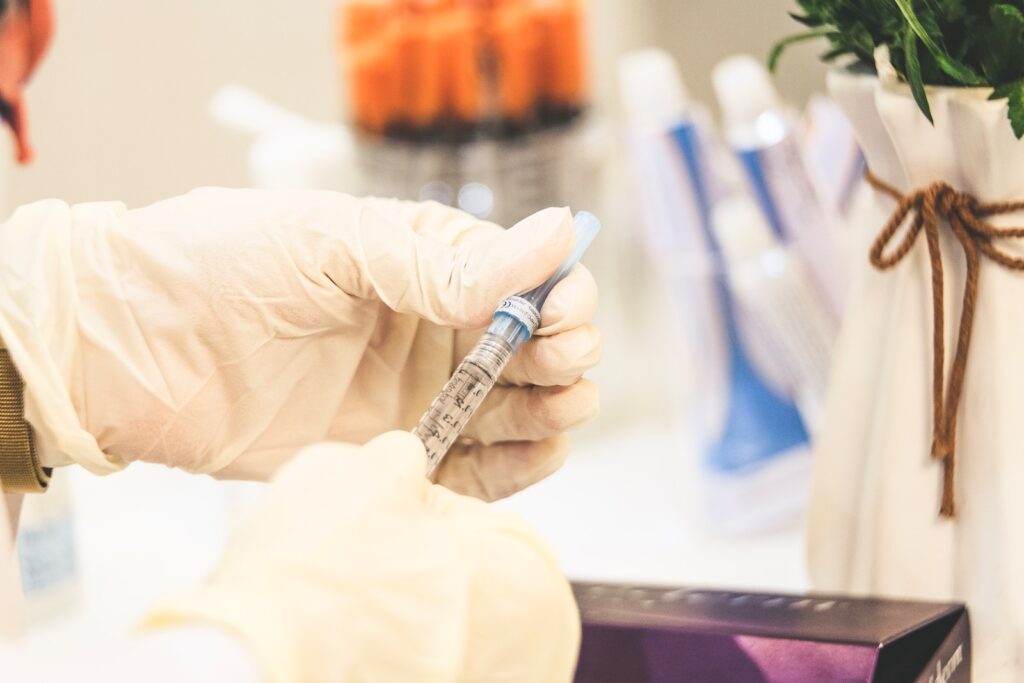Mesotherapy is a cosmetic procedure that involves injecting a mixture of substances into the middle layer of the skin, called the mesoderm. The substances can include vitamins, minerals, enzymes, hormones, plant extracts, and other ingredients that are tailored to the individual’s needs and goals. Mesotherapy is used to treat a variety of skin and body issues, such as aging signs, cellulite, fat reduction, hair loss, scars, and more. In this article, we will explain what mesotherapy is, how it works, what it can do for you, what are the possible side effects and risks, and how to prepare for and recover from the procedure.

Table of Contents
What is mesotherapy and how does it work?
Mesotherapy was developed in 1952 by Dr. Michel Pistor, a French physician who originally used it to treat pain and vascular disorders. Since then, mesotherapy has gained popularity in many countries as a cosmetic treatment for various aesthetic concerns. Mesotherapy is based on the idea that injecting small amounts of substances directly into the problem area can stimulate the skin’s natural healing and rejuvenating processes. The substances used in mesotherapy can vary depending on the condition being treated, but they generally aim to improve blood circulation, reduce inflammation, dissolve fat cells, stimulate collagen and elastin production, and nourish the skin.
The procedure of mesotherapy involves using very fine needles to deliver multiple injections into the mesoderm, which is about 1 to 4 millimeters below the skin surface. The injections are usually done with a special device that can control the depth, speed, and frequency of the needle. The amount and frequency of injections depend on the size and severity of the problem area, as well as the individual’s response to the treatment. Typically, mesotherapy sessions last about 15 to 30 minutes and are repeated every 7 to 10 days until the desired results are achieved. The number of sessions required can range from 3 to 15 or more.

What are the benefits of mesotherapy?
Mesotherapy can offer a number of benefits for people who want to improve their appearance without undergoing surgery or other invasive procedures. Some of the common benefits of mesotherapy are:
- Skin rejuvenation: Mesotherapy can help reduce wrinkles, fine lines, sagging skin, dullness, and uneven tone by stimulating collagen and elastin synthesis, hydrating the skin, and enhancing its glow and elasticity.
- Fat reduction: Mesotherapy can help dissolve stubborn fat deposits in areas such as the abdomen, thighs, hips, arms, chin, and neck by breaking down the fat cells and facilitating their elimination through the lymphatic system.
- Cellulite reduction: Mesotherapy can help smooth out the dimpled appearance of cellulite by improving blood circulation, reducing inflammation, and dissolving fat cells in the affected areas.
- Hair growth: Mesotherapy can help treat hair loss and thinning by stimulating blood flow to the scalp, nourishing the hair follicles, and promoting hair growth.
- Scar improvement: Mesotherapy can help fade scars by improving blood circulation, reducing inflammation, and stimulating collagen production in the scarred tissue.
- Pigmentation improvement: Mesotherapy can help lighten pigmented spots such as age spots, sun spots, melasma, and freckles by inhibiting melanin production and enhancing skin renewal.
What are the risks and side effects of mesotherapy?
Mesotherapy is generally considered a safe and minimally invasive procedure when performed by a qualified and experienced practitioner. However, like any medical procedure, it also carries some potential risks and side effects that should be aware of before undergoing treatment. Some of the possible risks and side effects of mesotherapy are:
- Infection: There is a risk of infection if the needles or the injected substances are not sterile or if proper hygiene is not maintained during or after the procedure. Infection can cause redness, swelling, pain, fever, pus formation, and other complications that may require antibiotics or other treatments.
- Allergic reaction: There is a risk of allergic reaction if the individual is sensitive or intolerant to any of the substances used in mesotherapy. Allergic reaction can cause itching, rash, hives, swelling, difficulty breathing, anaphylaxis (a life-threatening reaction), and other symptoms that may require antihistamines or other medications.
- Bruising: There is a risk of bruising due to bleeding from the injection sites. Bruising can cause discoloration, pain, and tenderness in the treated area that may last for a few days or weeks depending on the severity and individual’s healing ability.
- Swelling: There is a risk of swelling due to fluid retention or inflammation in the treated area that may last for a few hours or days after the procedure. Swelling can cause discomfort, tightness, and reduced mobility in the affected area that may interfere with daily activities.
- Nodules: There is a risk of nodules or lumps forming under the skin due to the injected substances not being absorbed or distributed evenly. Nodules can cause pain, tenderness, and irregularity in the skin texture that may last for weeks or months or require additional treatments to dissolve or remove them.
- Nerve damage: There is a risk of nerve damage due to the needle hitting a nerve or injecting too much pressure or volume into the nerve. Nerve damage can cause numbness, tingling, burning, or weakness in the treated area or nearby regions that may be temporary or permanent.
- Skin necrosis: There is a risk of skin necrosis or tissue death due to the injected substances causing vascular occlusion or blockage of blood flow to the skin. Skin necrosis can cause blisters, ulcers, blackening, or sloughing of the skin that may require surgical intervention or skin grafting to repair.
- Unsatisfactory results: There is a risk of unsatisfactory results due to the individual’s expectations not being met, the treatment not being effective, or the treatment causing adverse effects. Unsatisfactory results can cause dissatisfaction, frustration, regret, or psychological distress that may require additional treatments or counseling to cope with.

How to prepare for mesotherapy?
Before undergoing mesotherapy, it is important to consult with a qualified and experienced practitioner who can assess your condition, goals, medical history, allergies, medications, and other factors that may affect your suitability for the procedure. The practitioner can also explain the procedure in detail, answer your questions, address your concerns, and provide you with pre-treatment instructions and recommendations. Some of the common pre-treatment instructions and recommendations are:
- Avoid taking blood thinners such as aspirin, ibuprofen, warfarin, and others for at least one week before the procedure to reduce the risk of bleeding and bruising.
- Avoid taking supplements such as vitamin E, fish oil, garlic, ginkgo biloba, and others for at least one week before the procedure to reduce the risk of bleeding and bruising.
- Avoid drinking alcohol for at least 24 hours before the procedure to reduce the risk of bleeding and bruising.
- Avoid smoking for at least 24 hours before the procedure to improve blood circulation and healing.
- Avoid applying any creams, lotions, makeup, or other products on the treatment area on the day of the procedure to prevent infection and interference with the injections.
- Eat a light meal and drink plenty of water before the procedure to prevent dehydration and low blood sugar.
- Wear comfortable and loose clothing that can be easily removed or adjusted to expose the treatment area on the day of the procedure.
How to recover from mesotherapy?
After undergoing mesotherapy, it is normal to experience some mild discomfort, redness, swelling, bruising, or itching in the treated area that will subside within a few hours or days as the body heals and adapts to the injected substances. The practitioner will provide you with post-treatment instructions and recommendations to help you recover faster and better. Some of the common post-treatment instructions and recommendations are:
- Apply ice packs or cold compresses on the treated area for 10 to 15 minutes every few hours for the first 24 hours after the procedure to reduce swelling and inflammation.
- Take over-the-counter pain relievers such as acetaminophen or ibuprofen as needed to ease discomfort and inflammation. Avoid taking aspirin or other blood thinners as they can increase bleeding and bruising.
- Take antihistamines as needed to relieve itching and allergic reactions. Avoid scratching or rubbing the treated area as it can cause infection or scarring.
- Keep the treated area clean and dry for at least 48 hours after the procedure. Avoid washing, showering, bathing, swimming, or using any products on the treated area until it is fully healed. If needed, use a gentle cleanser and pat dry with a soft towel.
- Avoid exposing the treated area to direct sunlight, heat, or extreme cold for at least one week after the procedure. Wear sunscreen, a hat, or protective clothing when going outdoors to prevent sunburn or pigmentation changes.
- Avoid strenuous activities, exercise, or sports for at least 48 hours after the procedure. Resume your normal activities gradually as you feel comfortable and avoid putting pressure on the treated area.
- Drink plenty of water and eat a balanced diet rich in protein, vitamins, minerals, and antioxidants to hydrate your body and promote healing and detoxification.
- Follow up with your practitioner as scheduled to monitor your progress, evaluate your results, and determine if you need more sessions or adjustments.
Conclusion
Mesotherapy is a cosmetic procedure that involves injecting a mixture of substances into the middle layer of the skin to treat various skin and body issues, such as aging signs, cellulite, fat reduction, hair loss, scars, and more. Mesotherapy can offer a number of benefits for people who want to improve their appearance without undergoing surgery or other invasive procedures. However, mesotherapy also carries some potential risks and side effects that should be considered before undergoing treatment. Therefore, it is important to consult with a qualified and experienced practitioner who can assess your suitability, explain the procedure, and provide you with pre- and post-treatment instructions and recommendations. Here are some frequently asked questions about mesotherapy that may help you learn more about this procedure.
FAQs
- Q: How much does mesotherapy cost?
- A: The cost of mesotherapy can vary depending on the condition being treated, the number and frequency of sessions required, the type and amount of substances used, the practitioner’s experience and location, and other factors. According to Healthline, the average cost of mesotherapy in the United States ranges from $250 to $600 per session. However, some clinics may offer discounts or packages for multiple sessions or areas.
- Q: Is mesotherapy painful?
- A: Mesotherapy involves using very fine needles to inject small amounts of substances into the skin, which may cause some discomfort or pain during or after the procedure. However, most people tolerate the procedure well and describe the pain as mild to moderate. The practitioner may also apply a topical anesthetic cream or use a device that vibrates or cools the skin to reduce the pain. Additionally, taking over-the-counter pain relievers or applying ice packs or cold compresses after the procedure can help ease the pain.
- Q: How long does it take to see results from mesotherapy?
- A: The results from mesotherapy may vary depending on the individual’s response to the treatment, the condition being treated, and the number and frequency of sessions required. Some people may notice some improvement after the first session, while others may need several sessions to see noticeable results. Generally, it takes about 3 to 6 months for the full results to appear as the body heals and adapts to the injected substances.
- Q: How long do the results from mesotherapy last?
- A: The results from mesotherapy may last for several months to years depending on the individual’s lifestyle, skin type, age, and maintenance treatments. To prolong the results, it is recommended to follow a healthy diet, exercise regularly, drink plenty of water, avoid smoking and alcohol, use sunscreen and moisturizers, and have periodic touch-up sessions as advised by the practitioner.
- Q: What are the alternatives to mesotherapy?
- A: Mesotherapy is one of the many cosmetic procedures that can help improve various skin and body issues. Depending on your goals and preferences, you may also consider other alternatives such as:
- Laser therapy: Laser therapy uses beams of light energy to heat up and destroy fat cells, stimulate collagen production, reduce pigmentation, smooth out scars, and more.
- Radiofrequency therapy: Radiofrequency therapy uses electric currents to heat up and tighten the skin, reduce fat and cellulite, improve blood circulation, and more.
- Ultrasound therapy: Ultrasound therapy uses sound waves to break down fat cells, stimulate collagen production, lift and firm the skin, improve blood circulation, and more.
- Microneedling: Microneedling uses tiny needles to create micro-injuries in the skin that trigger its natural healing and rejuvenating processes. Microneedling can help reduce wrinkles, fine lines, sagging skin, scars, pigmentation, and more.
- Chemical peels: Chemical peels use acids or enzymes to exfoliate and remove the outer layer of dead or damaged skin cells. Chemical peels can help improve skin texture, tone, brightness, and more.
- Dermal fillers: Dermal fillers are injectable gels that fill in wrinkles, fine lines, hollows, and other areas of volume loss in the face or lips. Dermal fillers can help restore a youthful and plump appearance to the skin.
- Botox: Botox is an injectable toxin that temporarily paralyzes the muscles that cause wrinkles, fine lines, and other expressions in the face or neck. Botox can help smooth out and relax the skin.









